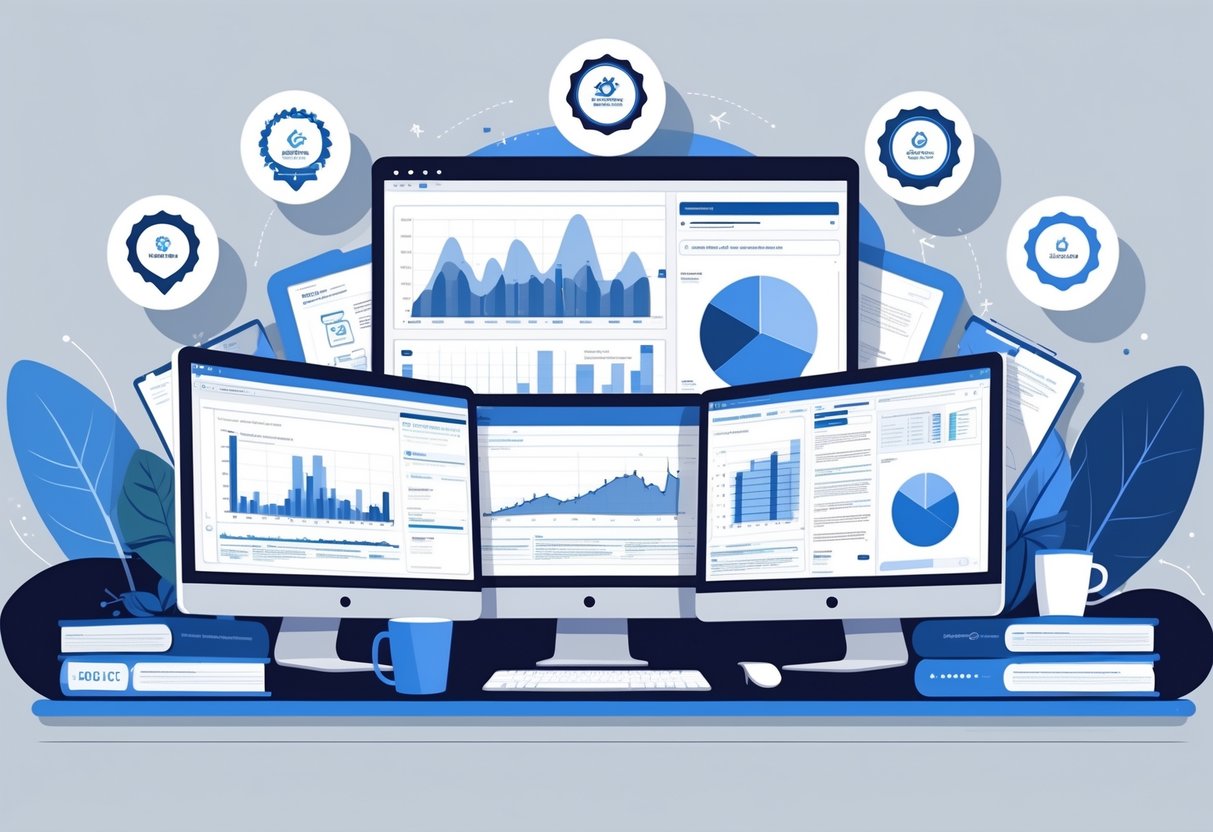Analytics engineering has become one of the fastest-growing roles in data science, bridging the gap between raw data and business insights.
As companies rely more on data-driven decisions, the demand for skilled analytics engineers continues to surge across industries.

The top certifications for analytics engineers in 2025 include Google Data Analytics Professional Certificate, Microsoft Certified Data Analyst Associate, and AWS Certified Data Analytics – Specialty. These credentials validate essential skills in data processing, visualization, and cloud-based analytics.
They demonstrate expertise in key tools like SQL, Python, Tableau, and Power BI that employers actively seek.
This guide explores the most valuable certifications for aspiring analytics engineers, from entry-level programs requiring no prior experience to advanced credentials that validate specialized skills.
Professionals will discover which certifications align with their career goals, the specific tools and competencies each program covers, and practical advice for selecting the right path forward.
Key Takeaways
- Entry-level certifications from Google and IBM require no prior experience and take 140-180 hours to complete.
- Advanced certifications like CAP and SAS require 3-5 years of experience and focus on predictive modeling and machine learning.
- Cloud-based certifications from AWS and Microsoft validate skills in modern data platforms that companies increasingly adopt.
Essential Certifications for Aspiring Analytics Engineers

Four key certifications stand out for analytics engineers: Google’s comprehensive data analytics program, Microsoft’s Power BI specialization, the prestigious CAP credential, and IBM’s practical analyst certificate.
These credentials cover fundamental analytics skills, visualization tools, advanced methodologies, and hands-on experience with industry-standard platforms.
Google Data Analytics Professional Certificate
The Google Data Analytics Professional Certificate serves as an ideal entry point for aspiring analytics engineers.
This comprehensive program covers the complete data analysis process from data collection to presentation.
Key Features:
- Duration: 180 hours of coursework
- Platform: Available through Coursera
- Tools Covered: Spreadsheets, SQL, R programming, and Tableau
The program emphasizes practical skills without requiring prior experience.
Students learn to ask analytical questions, prepare data, and conduct thorough analysis.
Upon completion, participants receive a portfolio of projects demonstrating their capabilities.
The curriculum focuses on real-world applications that analytics engineers encounter daily.
Prerequisites:
- Basic computer literacy
- Internet access for online modules
- Commitment to complete eight courses
This certification prepares professionals for entry-level data analyst roles.
It provides foundational knowledge that analytics engineers can build upon throughout their careers.
Microsoft Certified: Power BI Data Analyst Associate
The Microsoft Certified: Data Analyst Associate certification validates expertise in Microsoft Power BI, a critical tool for analytics engineers.
This credential focuses on transforming raw data into actionable business insights.
Core Competencies:
- Data preparation and modeling
- Visualization creation
- Report deployment and maintenance
- Dashboard sharing and collaboration
The certification requires 100-120 hours of preparation time.
Candidates must pass the DA-100 exam to earn this credential.
Technical Requirements:
- Familiarity with Microsoft Excel
- Understanding of database technologies
- Knowledge of data processing techniques
- Experience with data visualization concepts
Analytics engineers benefit from this certification’s emphasis on business intelligence tools.
Power BI skills are highly sought after in enterprise environments.
The program covers connecting to various data sources and creating interactive dashboards.
These skills directly apply to analytics engineering workflows and data pipeline visualization.
Certified Analytics Professional (CAP)
The Certified Analytics Professional (CAP) represents the gold standard for analytics certifications.
INFORMS offers this prestigious credential for experienced professionals seeking advanced recognition.
Experience Requirements:
- Bachelor’s degree plus five years of analytics experience
- Master’s degree plus three years of experience
- Seven years of experience without a degree
The certification covers the complete analytics lifecycle.
Topics include problem framing, data acquisition, methodology selection, and model deployment.
Examination Areas:
- Analytics process mastery
- Business problem identification
- Model building techniques
- Deployment strategies
- Lifecycle management
CAP certification requires adherence to professional ethics standards.
Candidates must submit detailed resumes documenting their analytical experience.
Recertification occurs every three years through continuing education.
This maintains the credential’s relevance and professional standards.
The rigorous requirements ensure CAP holders possess comprehensive analytics expertise.
This certification significantly enhances career advancement opportunities for analytics engineers.
IBM Data Analyst Professional Certificate
The IBM Data Analyst Professional Certificate provides practical training in essential analytics tools and methodologies.
IBM delivers this program through Coursera, making it accessible to aspiring analytics engineers worldwide.
Program Components:
- Spreadsheet analysis techniques
- SQL database querying
- Python programming fundamentals
- Statistical analysis methods
The curriculum requires 140 hours to complete.
No prior experience is necessary, making it suitable for career changers and recent graduates.
Hands-on Learning:
- Data cleaning projects
- Analysis case studies
- Presentation exercises
- Portfolio development
Students work with real datasets throughout the program.
This practical approach prepares them for actual analytics engineering challenges.
The certificate emphasizes business decision-making through data analysis.
Participants learn to communicate findings effectively to stakeholders.
Technical Prerequisites:
- Basic computer literacy
- Internet connectivity for online modules
- Willingness to learn programming languages
This IBM certification complements other credentials by providing vendor-specific expertise.
It demonstrates proficiency with enterprise-level analytics tools commonly used in large organizations.
Specialized Certifications for Advanced Analytics Skills

These advanced certifications focus on specialized tools and platforms that handle complex data science workflows, machine learning implementations, and enterprise-scale analytics solutions.
Each credential targets specific technology ecosystems and advanced analytical techniques.
SAS Certified Data Scientist
The SAS Certified Advanced Analytics Professional Using SAS 9 certification validates expertise in sophisticated data science techniques.
This credential focuses on predictive modeling, machine learning algorithms, and advanced statistical analysis.
Candidates must demonstrate proficiency in data mining, statistical modeling, and predictive analytics using SAS Enterprise Miner.
The certification covers text analytics, time series analysis, and optimization techniques.
Prerequisites include:
- Six months of SAS analytics experience
- Completion of SAS training courses
- Understanding of statistical concepts
- Bachelor’s degree in related field (recommended)
The program requires passing multiple exams covering predictive modeling, advanced analytics, and specialized techniques.
Data scientists and analytics professionals with 3-5 years of experience benefit most from this certification.
SAS tools remain dominant in enterprise environments.
This certification is valuable for professionals working with large-scale data processing and machine learning implementations.
AWS Certified Data Analytics – Specialty
The AWS Certified Data Analytics certification validates skills in designing and maintaining analytics solutions on Amazon Web Services platforms.
This specialty certification focuses on big data processing and cloud-based analytics architectures.
Candidates learn to integrate AWS services like Amazon Redshift, Kinesis, AWS Glue, and QuickSight.
The certification emphasizes data modeling, real-time analytics, and automated data processing workflows.
Key requirements:
- Two years of AWS analytics experience
- Hands-on experience with AWS data services
- Understanding of data analytics principles
- 80-120 hours of preparation time
The exam covers data collection, storage, processing, and visualization using AWS tools.
Professionals working with cloud-based big data solutions and streaming analytics find this certification particularly valuable.
Amazon Web Services continues expanding its analytics offerings.
This credential is increasingly important for cloud-focused analytics engineers.
Cloudera Certified Associate (CCA) Data Analyst
The Cloudera Data Analyst Certification focuses on big data analysis within Hadoop ecosystems.
This certification emphasizes SQL query optimization and large-scale data processing using Cloudera platforms.
Candidates must demonstrate expertise in Apache Impala, HDFS, and Hadoop-based analytics.
The certification covers data mining techniques and performance optimization for massive datasets.
Essential skills include:
- Advanced SQL query writing
- Hadoop ecosystem knowledge
- Cloudera Impala proficiency
- Large dataset manipulation
The hands-on exam requires practical problem-solving using Cloudera tools.
Candidates work with real datasets to demonstrate analytical capabilities and query optimization skills.
Big data analysts and SQL developers benefit from this certification when working in Hadoop environments.
The credential validates technical skills needed for enterprise-scale data processing and analysis.
Google Cloud Professional Data Engineer
The Google Cloud Professional Data Engineer certification targets comprehensive data science and engineering workflows.
This credential covers machine learning integration, data modeling, and scalable analytics architectures on Google Cloud Platform.
Candidates learn BigQuery, Dataflow, Cloud ML Engine, and other Google analytics services.
The certification emphasizes real-time data processing, machine learning pipelines, and automated analytics solutions.
Core competencies include:
- Data modeling and architecture design
- Machine learning implementation
- Stream and batch processing
- Data security and compliance
The exam requires designing end-to-end analytics solutions using Google Cloud services.
Professionals must demonstrate skills in data science workflows and big data processing architectures.
This certification suits data engineers building scalable analytics platforms and implementing machine learning solutions in production environments.
Key Skills and Tools Validated by Leading Certifications

Most analytics engineer certifications test candidates on four core technical areas that employers value most.
These skills include database management, programming abilities, visualization expertise, and data preparation techniques.
SQL and Database Proficiency
SQL stands as the most critical skill for analytics engineers.
Certifications test candidates on complex queries, joins, and database optimization techniques.
Most programs cover advanced SQL concepts like window functions and common table expressions.
These skills help professionals work with large datasets efficiently.
Database design principles form another key testing area.
Candidates learn about normalization, indexing, and performance tuning strategies.
Popular SQL certification topics include:
- Data modeling and schema design
- Query optimization techniques
- Stored procedures and functions
- Database administration basics
Cloud database platforms receive significant attention in modern certifications.
AWS, Google Cloud, and Azure database services appear frequently in exam content.
Programming Languages: Python and R
Python programming skills are essential for most analytics roles today.
Certifications focus on data manipulation libraries like pandas and numpy.
R programming appears in statistics-focused certification tracks.
Candidates learn data analysis techniques using R’s built-in statistical functions.
Core programming concepts tested:
- Data structures and variable types
- Control flow and conditional logic
- Function creation and debugging
- Package management and imports
Python data science libraries receive heavy emphasis.
Professionals must demonstrate skills with matplotlib, seaborn, and scikit-learn for analysis tasks.
R programming certifications cover statistical modeling extensively.
Topics include regression analysis, hypothesis testing, and statistical visualization techniques.
Data Visualization Tools: Tableau and Power BI
Tableau certifications test dashboard creation and advanced visualization techniques.
Candidates must show proficiency with calculated fields and parameters.
Microsoft Power BI skills focus on DAX formulas and Power Query functionality.
These tools help create dynamic reports and data transformations.
Key visualization skills evaluated:
- Chart selection for different data types
- Interactive dashboard design
- Color theory and visual best practices
- Performance optimization for large datasets
Data storytelling principles appear across all visualization certifications.
Professionals learn to present insights clearly to business stakeholders.
Both Tableau and Power BI certifications include data connection methods.
Candidates work with various file formats and database connections.
Excel and Data Cleaning Techniques
Excel remains fundamental for many analytics workflows.
Certifications test advanced formulas, pivot tables, and data analysis tools.
Data cleaning techniques span multiple platforms and tools.
Professionals learn to identify and fix common data quality issues.
Essential Excel skills include:
- Advanced formulas and functions
- Pivot table creation and customization
- Data validation and conditional formatting
- Macro development basics
Statistics knowledge supports data cleaning efforts.
Professionals identify outliers, missing values, and inconsistent data patterns effectively.
Power Query integration with Excel receives growing attention.
This tool helps automate data cleaning and transformation processes for recurring analysis tasks.
Choosing the Right Certification for Your Analytics Engineering Career

Success in analytics engineering depends on matching certification choices to specific career goals and experience levels.
The path forward varies significantly based on whether someone needs foundational training or advanced specialization, and different formats serve different learning styles and schedules.
Career Advancement and Industry Demand
Analytics engineers with the right certifications see faster promotion rates and higher salaries.
Data analytics certifications verify qualifications to manage, analyze, and interpret data—skills that prove invaluable across many industries.
Entry-level professionals benefit most from broad certifications like the Google Data Analytics Professional Certificate.
These programs prepare candidates for data analyst jobs without requiring prior experience.
Mid-career professionals should target specialized credentials.
The Certified Analytics Professional (CAP) from INFORMS validates expertise in the complete analytics process and requires 3-5 years of experience.
Senior practitioners gain credibility through advanced certifications like AWS Certified Data Analytics or SAS Advanced Analytics Professional.
These credentials demonstrate mastery of complex data management systems.
Business analytics roles increasingly demand cloud platform expertise.
Companies prioritize candidates who understand modern data infrastructure over traditional statistical methods.
Educational Prerequisites and Experience Levels
Most analytics engineering certifications have specific educational and experience requirements that determine eligibility.
Understanding these prerequisites helps professionals choose realistic certification paths.
No Experience Required:
- Google Data Analytics Professional Certificate requires no formal education
- IBM Data Analyst Professional Certificate welcomes beginners
- Basic computer literacy serves as the only prerequisite
Bachelor’s Degree Plus Experience:
- CAP certification requires a bachelor’s degree plus five years of analytics experience
- DASCA Senior Data Analyst needs three years of professional work
- Alternative: seven years of experience without a degree
Advanced Requirements:
- AWS Data Analytics Specialty demands two years of hands-on AWS experience
- SAS Advanced Analytics requires six months of SAS software experience
- Cloud certifications need platform-specific knowledge
Professionals without a bachelor’s degree can still pursue many certifications.
Experience often substitutes for formal education in this field.
Certification Formats: Bootcamps, Courses, and Exams
Different certification formats suit different learning preferences and career timelines.
Each format offers distinct advantages for busy professionals.
Online Courses:
- Google certification takes 180 hours to complete
- Microsoft Data Analyst Associate requires 100-120 hours
- Self-paced learning fits working schedules
Intensive Bootcamps:
- Data analytics bootcamps provide immersive training
- Faster completion than traditional courses
- Higher upfront time commitment required
Exam-Only Certifications:
- Tableau Desktop Certified Associate takes 30-40 hours
- Focus on proving existing skills
- Require independent study and preparation
Hybrid Programs:
- Combine coursework with hands-on projects
- Include portfolio development
- Balance theory with practical application
Professionals should consider their learning style and available time when selecting formats.
Online courses offer flexibility while bootcamps provide structure and community support.
Frequently Asked Questions
Analytics engineering professionals have specific questions about certification paths and industry recognition.
The best analytics engineer certifications for 2025 include options like Google’s professional certificate, CAP credentials, and specialized data engineering programs.
What are the top certifications to pursue for a career in analytics engineering?
The top analytics certifications recommended by experts include several key options for aspiring professionals.
Google Data Analytics Professional Certificate ranks as one of the most popular starting points.
Microsoft Azure Data Engineer Associate and AWS Certified Data Analytics provide cloud-specific skills.
Snowflake SnowPro certifications focus on modern data warehousing platforms.
Tableau Desktop Specialist and Power BI certifications cover visualization tools.
These credentials help professionals demonstrate technical skills in specific platforms.
Which data analytics certifications are recognized by the industry for their value?
Industry professionals recognize several certifications for their practical value and employer acceptance.
Google Data Analytics Professional Certificate receives wide recognition from employers.
Microsoft and AWS certifications carry significant weight due to their cloud platform dominance.
SAS Certified Data Scientist and IBM Data Science Professional Certificate maintain strong industry standing.
These programs offer hands-on experience with enterprise-level tools.
How does the Google Data Analytics Professional Certificate compare to other certifications in the field?
The Google Data Analytics Professional Certificate stands out as one of the most popular data analytics certifications available to professionals.
It offers beginner-friendly content and practical project experience.
The program takes 3-6 months to complete at 10 hours per week.
It costs significantly less than university programs while providing job-ready skills.
Google’s certificate covers R programming, SQL, and Tableau basics.
Other certifications like AWS or Microsoft focus more on cloud platforms and advanced technical skills.
What is the Certified Analytics Professional (CAP) credential and is it recommended for aspiring analytics professionals?
The Certified Analytics Professional (CAP) credential represents a vendor-neutral certification for analytics professionals.
It covers the complete analytics process from problem definition to model deployment.
CAP requires professional experience before certification eligibility.
Candidates need three years of analytics experience or a master’s degree plus one year of experience.
The certification exam covers seven domains including business problem framing and analytics methodology.
It suits experienced professionals more than beginners starting their analytics careers.
Are there any reputable data analytics certifications available for free?
Several reputable organizations offer free data analytics training and certification options.
Coursera provides free access to course materials for many programs, though certificates require payment.
Kaggle Learn offers free micro-courses in Python, SQL, and machine learning.
These short courses provide practical skills without certification fees.
Google Analytics Academy provides free training for web analytics.
IBM offers some free courses through their SkillsBuild platform for basic data science concepts.
How important is it for data engineers to obtain certifications in analytics, and which ones are the best for this role?
Certifications help data engineers demonstrate specialized skills and stay current with evolving technologies.
Earning a data engineering certification can validate technical expertise and increase job prospects.
Cloud platform certifications like AWS Certified Data Engineer and Google Cloud Professional Data Engineer are highly regarded.
These credentials show proficiency with modern data infrastructure.
Apache Spark certifications and Databricks credentials focus on big data processing.
Snowflake and dbt certifications align with modern data stack requirements that analytics engineers commonly use.




